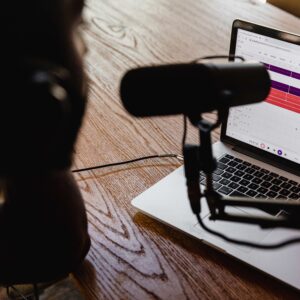Touring musician, composer, and producer Jess Grommet explains how the right podcast music can drive your podcast’s narrative.
When he isn’t hard at work in the studio or riffing onstage, Nashville-based musician Jess Grommet lends his talents to another gig: composing music for podcasts.
After years of composing podcast music, Grommet finds that the songs you choose can not only engage listeners but draw them in. More importantly, podcast scoring amplifies the story you’re telling.
“You’re trying to support the story and guide the listener a little bit to the way we want them or hope for them to feel,” Grommet said.
In this episode of Brandcasting, we sat down with Grommet to find out why music is such an integral part of podcasting and how he helps Relationary’s clients find the right sound for their shows.

Supporting the story
Though your favorite podcasts’ music may fly under the radar, chances are that it has been carefully selected or composed to strengthen the story you’re hearing.
“It’s kind of like when you think of your favorite movie soundtracks and TV soundtracks. Any music that’s made for media – it’s all kind of the same philosophy,” Grommet explained. “At the end of the day you’re trying to elevate and support whatever is happening on screen — or in our case on audio, the narration or interview.”
Your podcast music shouldn’t be viewed as simply background noise. When integrated well, music can structure the listener’s experience of your story. It can create an atmosphere, smooth a transition or trigger an emotional response.
Certain sounds can guide listeners through a story or interview. For example, a minor chord may provoke a spooky or sad atmosphere, while the sound of a ukulele can transport listeners to the beachside.
“We’ve all grown up hearing so many movie soundtracks and TV soundtracks that we’ve just kind of been conditioned to think that there’s certain cues that direct us to certain emotions,” he said.
It’s important to have an understanding of what feeling you want to convey with your music. For branded podcasts, Grommet says it’s often wise to focus on sending subtle messages through your music.
“It needs to be fresh and intriguing and professional. It’s not quite as emotional — we’re not trying to make people cry,” Grommet explained. “The way that I think of it is as a harmony that rather than being gut-punching and heart-wrenching, it’s easy on the ears.”
Finding your groove
Podcasters can curate their show’s music to fit their distinct style. With all the different musical styles, genres and rhythms to choose from, you can find a sound that is unique to your brand.
“The way I describe the process of composition is a lot like cooking,” Grommet said. “If you want something to taste spicy, you can put paprika in there—any number of things. And music’s totally the same way.”
This flexibility in music means you have a wealth of options to choose from. Grommet says the best way to start is by creating a list of adjectives that you think reflects the style of your brand.
“I like when clients give us one adjective and then a qualifier,” Grommet commented. “So ‘energetic but not sassy’. Or something that’s ‘bouncy, but not too playful.’”
When choosing your sound, it’s also important to remember to keep the narrative front and center. The podcast music should complement the story, not drown it out.
“I’ll start with a rhythmic groove with podcast music because, even a lot of the podcasts that I listened to in reference, the music that they have is something that’s not too harmonically and melodically distracting,” said Grommet. “You don’t want to be singing along with it.”
Luckily, you don’t have to start from scratch, Grommet pointed out. There are plenty of resources out there for those looking for inspiration and discover what kind of music might fit your podcast.
“There’s a company in town called That Sound… they’re a really, really great drum sample library,” he said. “I use their drum sounds for just about everything, and I find that their loops are really inspiring to start things with.”
Custom composed music vs. royalty free
Podcasters can choose one of two paths for their episode scoring: original music, created by composers like Grommet, or royalty free music available to buy online.
Grommet recommends weighing the pros and cons of each path before picking your sound.
“Royalty free is probably a little less expensive and there’s so much music out there that you will probably find something you’re looking for,” he said. “But that’s also the con. It’s going to take a while to find exactly what you’re looking for.”
Even if you do find a sound you really love on a royalty-free music site, Grommet advises to make sure it fits your podcast’s narrative. You want to shape your music to meet your message – not the other way around.
“That’s sort of the pro of having custom-composed music for podcasts: people like me are able to shape the music around what’s already there. Kind of like scoring a film.”
With custom podcast music, you’re able to have control over key creative decisions. Your music won’t run the risk of overwhelming the story you’re telling.
“It’s not going to be inherently distracting or the focal point. I feel like a lot of the royalty free music tends to be musically distracting because the creators are creating it stand alone. They’re not creating it with the narration in mind.”
Don’t miss a single episode! Follow Brandcasting wherever you get your podcasts and for more content like this, subscribe to our newsletter. Ready to build your own branded podcast? Let us help you get started with a free consultation.


